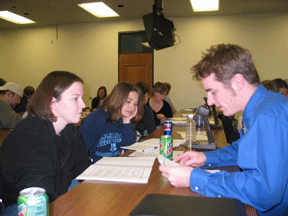 |
Andy Horn, right, of the UNMC pulmonary research lab, plays the role of a physician counseling a “smoker” who wants to quit smoking. The “smoker” was played by medical student Melissa St. Germain, far left. Rating the counseling session was medical student Shannon Kinnan, center. |
For more than 25 years, experts in UNMC’s pulmonary research lab have been involved in smoking cessation programs and research. Now, they’re passing that breadth of information on for the benefit of people who want to stop smoking.
Experts in UNMC’s pulmonary research lab recently trained more than 50 students and pulmonary research staff members during a three-and-a-half hours training session. Participants, who received certification for basic smoking intervention, will use the knowledge at the Student Health Alliance Reaching Indigent Needy Groups (SHARING) Clinic for the underserved in South Omaha.
“There’s a lot of wrinkles in the smoking cessation field that people don’t know about. Our techniques are research-based,” said Dave Daughton, pulmonary medicine researcher, UNMC Pulmonary Research Laboratory.
The idea, he said, is to support smokers who want to participate in smoking cessation programs. “This will train students and others who want to work with underserved patients to help them quit smoking. It’s a benefit for our health professionals to have the skills, not only to give people a physical reason sufficiently strong enough for them to quit smoking, but also the ability to quit. It can be quite successful.”
The training includes how to identify what smoking cessation products and services work best for those trying to quit, providing smoking cessation counseling and how to work with relapsed smokers.
Role-playing during the training in small groups gives participants the chance to practice what they’ve learned.
Melissa St. Germain, a medical student who volunteers at the SHARING Clinic, said the training was valuable. “I’ve seen a lot of smokers come through the clinic,” St. Germain said. “But we never had any formal training to know what to tell them.”
Kate Fiandt, D.N.S., clinical director of the Family Health Care Center where the SHARING Clinic is held each Tuesday, is excited about the smoking cessation service that will now be available to patients.
“This will have a significant impact on the health of our patients at the SHARING Clinic,” said Dr. Fiandt, UNMC College of Nursing associate professor of nursing and SHARING Clinic board member and faculty advisor. “Many of them are smokers and are open to quitting smoking but don’t feel they have the resources, in money or support, to stop. In addition to the counseling the students are being trained to offer, we will work with UNMC pulmonary experts and Hope Medical Outreach Coalition to provide low-cost medications that will help them.”
Those who participate in smoking cessation programs at the clinic also may receive free nicotine replacement products such as the nicotine patch, nicotine gum, nasal spray and Zyban, an anti-smoking drug.
A $5,000 grant awarded to Stephen Rennard, M.D., Larson Professor of Medicine, UNMC Pulmonary and Critical Care Section, by the American College of Chest Physicians, is helping to provide the smoking cessation products.
“The products will help people stop smoking,” Dr. Rennard said. “Currently there are no counseling services available to patients at the clinic, and many of the patients don’t have the resources to pay out of pocket for these smoking cessation aids. The medications, in combination with smoking cessation counseling, will have a dramatic effect on their overall health risk.”
UNMC has been involved in many national studies involving stop-smoking products on the market, including the nicotine patches, nicotine gum and Zyban, a pill that decreases the craving to smoke and has some anti-depression effects. Dr. Rennard, who has written about 100 articles, is considered one of the most published researchers in the world on smoking cessation. Daughton has seen about 1,500 smokers in his 25 years of UNMC smoking cessation studies.